The Proposition
It's Sunday afternoon. Rain and sweat drip from my brow. The woman behind the counter looks at me with piercing eyes. I give her money. She hands me a ticket. I turn around. He is standing at the bottom of the stairs. He puts out his hand and smiles. I walk up to him. He points towards his watch. I run. I hear a barrage of gunfire. There is a siege going on in there. I take a deep breath, push the doors and scamper down the steps. I take cover in front of one of those grungy red seats. There is chewing gum inside the cup holder. I hear the sound of machine-gun fire from that little box window. I see Charley and Mikey Burns, the Irish outlaws, scamper towards a broken window. A burst of gunfire invades the room. A bullet goes through Mikey's arm. There is a pool of blood on the floor. There is no escape for any of us. Captain Stanley, the British police captain walks into the room and presents Charley with a proposition: kill the outlaw Arthur Burns. If he does not, his younger brother Mikey will be hung from a noose on Christmas Day. With his horse and gun, Charley must commit the ultimate sin: to kill his brother in order to save another...
On its release in America the film critic Roger Ebert called it, 'a movie you cannot turn away from; it is so pitiless and uncompromising, so filled with pathos and disregarded innocence, that it is a record of those things we pray to be delivered from.' The musical genius Nick Cave (of Bad Seeds fame) penned this 'uncompromising' screenplay. It stars Guy Pearce (who perplexed audiences in Memento), Ray Winstone (who was 'class' in Sexy Beast), Danny Huston (who made 30 Days of Night semi-watchable), John Hurt (whose best performance has to be The Elephant Man), David Wenham (Faramir in the Lord of the Rings) and Emily Watson (who blew audiences away in Red Dragon). The director was John Hillcoat, whose long-awaited post-apocalyptic nightmare The Road starring Viggo Mortensen will be hitting cinemas in January 2010.
Nick Cave's unremitting script is curious, John Hillcoat's direction: distinctive. This Australian western has an ethereal edge, which gives the frame a sense of biblical anguish. Even though it has a fine list of acting talent on display, the most important performance in The Proposition has to be the Australian wastelands. Hillcoat and Cave haul the natural milieu of Australia to the forefront - in their dark twisted minds; the environment becomes a tool to reflect the characters state of mind. Wind howls through skeleton-like trees, the brown comatose ground bakes in the heat and the yellow and orange sunset fades into darkness. In The Proposition, nature is an unbiased and barbarous beast.
Even though they are eclipsed by the vast desert-like landscape, the acting talent is top-notch. Guy Pearce who plays Charley looks like a starving ghost. Bones explode out of his tight flesh. Flies swarm all over his dirt-embedded skin. His face sings a thousand unsung melodies (he is a man forced into the heart of darkness). Emily Watson (Martha) is meek and sheepish yet displays an undying strength that gives her husband Captain Stanley dignity. John Hurt, who plays the bounty hunter, is an old-school legend as always. You feel his anguish and alcoholism. He is an actor that can convey a conveyer belt of emotions with just one expression. The depth of his characters inner life overshadows his surface characteristics. No matter how small his role, he always brings significance to his part. Danny Huston, in his best performance to-date, plays Arthur Burns, a mystical beast of a man with wolf-like eyes that pierce your soul.
The Proposition focuses on two vital ingredients: characters and conflict. It also poses an important question: what is the nature of justice? How can civilised people be moral when they witness barbaric acts of violence? The unremitting scene of repulsion begins after Captain Stanley's wife Martha (Emily Watson) and Eden Fletcher (David Wenham) kick up a fuss about justice (Martha's pregnant friend was rapped then murdered by the savage Arthur Burns). They want to see the adolescent Mikey punished for his older brother's crime. He is to be flogged a hundred times to provide a sense of twisted justice. As the townsfolk encircle the prison like flies to excrement, they demand that Mikey be discharged for his punishment. Their collective voice declares atonement. A disheveled Captain Stanley with blood-soaked eyes stands against the closed doors of the prison with a gun in hand and shouts in his gravel-like voice 'I'll shoot the first person who lays their hand on Mike Burns'. This is a pointless act of vengeance and carnage that he refuses to engage with.
The situation gets worse when his wife shows up and asks him - 'what if it was me Stanley?' He throws the keys to the floor in resignation. Mikey is dragged from his cell, hauled across the ground, and tied to a piece of wood in a Christ-like pose. Instead of showing us the flogging in all its bloody repugnance, we cut to a scene of the Burns clan hiding in the outback. One of them is singing 'Peggy Gordon' ('O Peggy Gordon, you are my darling, come sit down upon my knee and tell to me the very reason why I am slighted so by thee'). The lyrical union of these juxtaposed scenes confuses our emotions. The haunting angel-like voice distils and unsettles. We are repulsed by the man holding the whip, shocked by the snake-like Eden Fletcher who watches the flogging with joy, saddened by the pain on Ray Winstone's face ('I am so deep in love that I can't deny it, my heart lies smothered in my breast but it's not for you to let the whole world know it, a troubled mind can find no rest').
Ray Winstone is the star of the show. The Captain Stanley character is a tortured soul with a kaleidoscope of conflicting emotions. There is likeability to this character even though he can be repulsive. He is a man who fighting for justice in an unjust world. A man plagued by his sense of principles. There is humanity in Winstone's performance and he plays it with modest perfection. Winstone is an actor that 'needs' more meaty roles like this one to show the world of cinema what a special talent he really is.
Verdict: The Proposition is a gritty and redemptive western. The script by Nick Cave is savage, nihilistic, and transcendental. The direction: undiluted, like a bottle of Jack Daniels. Its significance will be felt for years to come (maybe even attaining cult status when it is revaluated years down the line). Watching the swelling of violence as it brews and boils on screen is like rubbing sandpaper all over your face - it's painful. Somehow, it is also beautiful.
Special Features: There is an interesting 27min 'making of' documentary with interviews from the cast and crew. However, people familiar with the Tartan DVD release will be dismayed that none of the features have been transferred to Blu-ray. The informative audio commentary track by John Hillcoat and Nick Cave has been omitted, the 86min documentary 'Meet the Cast and Crew' and the UK exclusive interviews with Guy Pearce (14min) and Danny Huston (8min) are nowhere to be found.
Disc: What can be said about the quality of Blu-ray besides showering it with colourful adjectives like 'vivid', 'splendid', 'beautiful' and 'outstanding'? You end up sounding like a broken record with a dodgy needle when discussing the superior 1080p picture quality. However, it needs to be said. This release of The Proposition is amazing. You can see the dirt behind the characters ears, the yellow and black tinge to their teeth, individual stray hairs and all those hidden facial pores that you never get to see on those 'crappy' DVDs. It's f***ing brilliant on a 46" plus High-Definition TV.
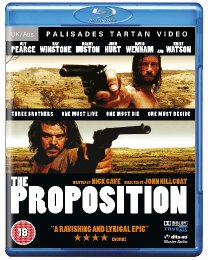
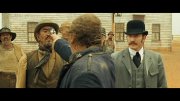


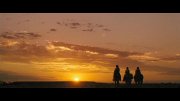
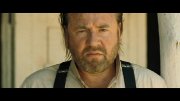
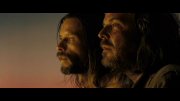
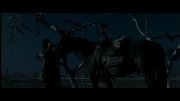
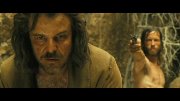
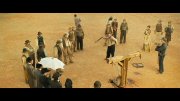







































Your Opinions and Comments
Be the first to post a comment!